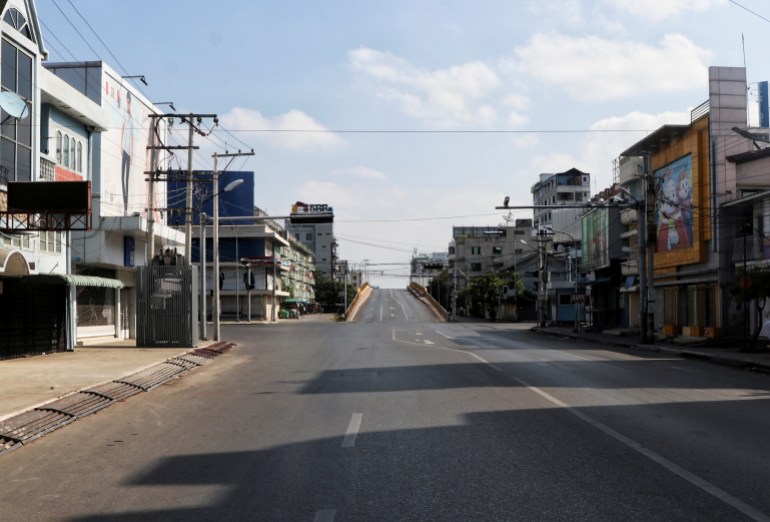‘Silent strikes’ against military gov’t empty Myanmar streets
Such strikes are seen as a safer way to protest as 1,300 people were killed by security forces since a military coup in February.

Pro-democracy protesters across cities and towns in Myanmar have staged “silent strikes”, the latest act of resistance against the military government that removed elected leader Aung San Suu Kyi more than 10 months ago.
Such actions are seen as a way to safely express opposition to the ruling military authorities as protests since the February 1 coup have been met with a brutal crackdown by security forces. More than 1,300 people have been killed, according to a local monitoring group.
Keep reading
list of 3 itemsMyanmar court due to deliver first verdicts in Suu Kyi trial
Aung San Suu Kyi jalled; military cuts sentence to two years
The streets of Yangon, the country’s largest city, were deserted on Friday, with all business closed and the usually bustling highways were eerily quiet. The famous Shwedagon pagoda, a Buddhist site that tends to receive many daily visitors and pilgrims, was also quiet.
The United States embassy in Yangon had advised its citizens to stay off the streets on Friday, citing a heightened risk of violence by security forces against any gatherings or protests.

At 4pm local time, some Yangon neighbourhoods resounded to the noise of mass clapping to mark the end of the strike.
In the second-largest city of Mandalay, a resident said restaurants, shops and the main market were all closed. “There have been no street vendors since this morning, no early morning walkers,” the person told the AFP news agency on condition of anonymity.
Pictures in local media also showed empty streets in the southeastern city of Mawlamyine and in towns across the northern Sagaing region.
As protesting has increasingly become too dangerous, those still taking to the streets now do so in smaller flashmobs lasting just minutes in order to avoid arrest. Myanmar soldiers rammed a car into one such rally in Yangon last Sunday, killing five people, according to local media. The military authorities said only three protesters were wounded.

Friday’s “silent protests” came just after the country’s military leader Min Aung Hlaing was accused before the International Criminal Court (ICC) of committing crimes against humanity for overseeing, as army chief, the deadly crackdown on protesters and activists opposed to the coup.
The Myanmar Accountability Project (MAP) urged The Hague-based tribunal to open a criminal investigation “into the widespread and systematic use of torture as part of the violent crackdown against the protest movement” in Myanmar.
Meanwhile, a court on Monday jailed Aung San Suu Kyi for two years for incitement against the military and flouting coronavirus restrictions during elections her party won last year. She was initially given a four-year term. The sentence was reduced after a partial pardon from Min Aung Hlaing, state TV reported.
The Nobel Peace Prize laureate faces a raft of other charges, including violating the official secrets act, corruption and electoral fraud. The 76-year-old faces decades in prison if convicted on all counts.